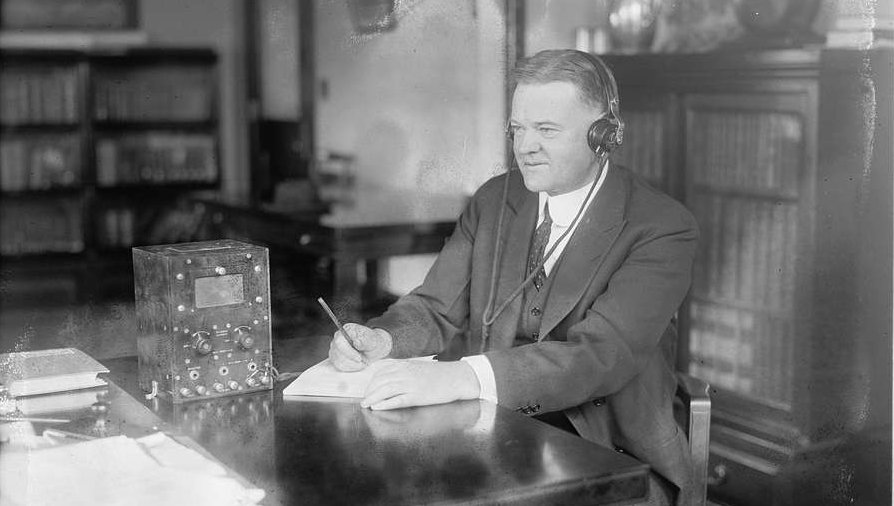Smart guys were saying don’t do it. But the President – a pretty smart guy himself; a business guy – ignored them. He signed the tariff legislation anyway, imposing hefty duties on just about everything America imported from just about everywhere.
Our trading partners saw this as a great, big red-white-and-blue middle finger aimed straight at them. They returned the gesture. Some historians think the ensuing trade war triggered the Great Depression. Others think that it at least made the Depression a good deal worse. (Some neoconservatives — remember them? — have argued that what really caused the Depression was fear that the tariff wouldn’t pass.)
That President was Herbert Hoover. He was wealthy, a genuinely self-made man. He had no family real estate fortune behind him; no reality TV makeover to brand him as something he was not. Hoover had been Secretary of Commerce during the Roaring ’20s.
What did he do about the Depression? Not enough, thought the millions of Americans who voted him out in a landslide first chance they got. But he did do something about immigration, for Hoover’s administration deported nearly 2 million Mexicans and Mexican-Americans. The slogan was: “American jobs for Americans.”
The legislation Hoover signed was the infamous Smoot-Hawley tariff of 1930. For those who’ve never heard of Smoot-Hawley, a little background. American farmers had struggled during the 1920s. Some had made money hand-over-fist during World War I, when other grain regions were affected by war. The American farmers had bought more land (with borrowed capital) so that they could make more money. But then World War I ended, the inflated wartime market deflated, and farmers were left with land they didn’t need and debt they couldn’t repay.
They wanted a tariff to protect them from foreign competition. When Hoover ran for President, he promised they’d get one. Congressional committees went to work on a new tariff right after he took office, and so did the lobbyists. In the committees, chaired by Senator Reed Smoot of Utah and Representative Willis Hawley of Oregon, the tariff soon grew into a classic legislative Christmas tree.
The tree was hung with presents for everyone. If your constituents manufactured firearms or cement or cloth, you put in a provision just for protecting them. Smoot’s Utah beet-sugar interests? Sure. Hawley’s Oregon forest products firms? You bet.
Big American exporters, which included producers of automobiles and petroleum, lobbied against the tariff. More than 1,000 American economists signed a letter to Hoover urging him to veto it. Hoover he didn’t. And the trade war happened. Soon afterward, the United States and other industrial countries started trying to regulate tariffs and trade.
That’s why people with some sense of economic history think Trump’s proposed tariffs — 60% on goods from China, 20% on goods from everywhere else — are a bad idea. He argues otherwise, even suggesting that the windfall from tariffs would lead to abolishing income taxes.
But if you believe his tariffs wouldn’t drive up prices for the same consumers who are currently concerned about the costs of gas and groceries, and would even make income taxes unnecessary, he may just have some real estate he’d like to sell you. And maybe a dictionary: In his dictionary, he says, “tariffs” is “the most beautiful word.”
Discover more from Post Alley
Subscribe to get the latest posts sent to your email.

Guess we find out
Never underestimate the appeal–er, power–of magical–er, positive–thinking.
Can you arrange tariffs/duties to be paid by the exporting company, instead of the domestic consumer? E.g., a Chinese company paying a 5% tax to the US government when they export laptops here? (It’s been a while since my college economics courses, I don’t mind a refresher on international trade basics.)